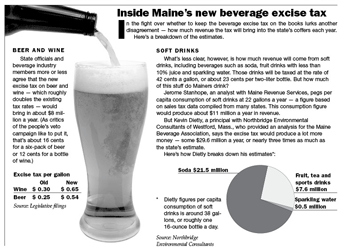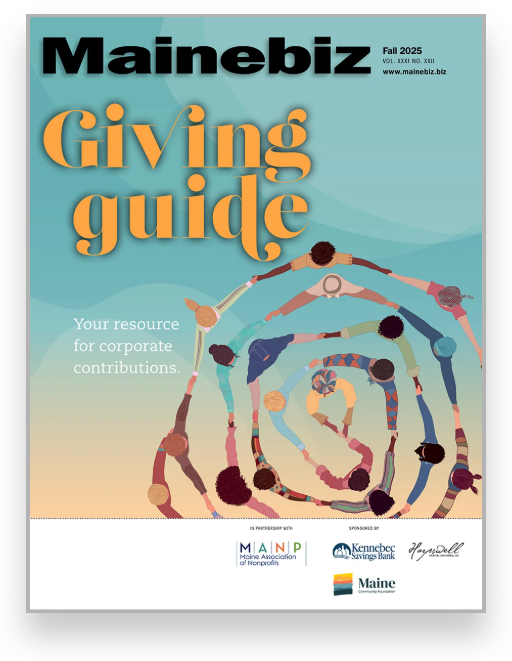Processing Your Payment
Please do not leave this page until complete. This can take a few moments.
- News
-
Editions
View Digital Editions
Biweekly Issues
- October 20, 2025
- October 6, 2025
- September 22, 2025
- September 8, 2025
- August 25, 2025
- August 11, 2025
- + More
Special Editions
- Lists
- Viewpoints
- Our Events
- Calendar
- Biz Marketplace
Bottled up | With petitions in hand, business leaders and industry groups rail against the Legislature's tax hike on soda, beer and wine
 PHOTO/DAVID A. RODGERS
The Maine Beverage Association's Newell Augur heads the Fed Up With Taxes coalition
PHOTO/DAVID A. RODGERS
The Maine Beverage Association's Newell Augur heads the Fed Up With Taxes coalition

Business leaders are frequent visitors to the State House. During legislative sessions, they can be seen roaming the halls daily — whether with lobbyists from chambers of commerce or any of the dozens of trade groups that regularly populate the State House — trying to convince lawmakers to pass or defeat legislation and, increasingly, trying to control important parts of the state budget.
But they work for the most part behind the scenes. That could change significantly if a signature-gathering campaign for a people’s veto of taxes to support the Dirigo Health program is successful.
The tax is set to start August 1, unless the petition effort to put the issue to voters is successful. If opponents of the tax submit 55,087 valid signatures by the July 17, Maine voters will become part of the long-running debate over the state’s tax burden. In November, they would decide whether the subsidized insurance program offered by the Dirigo Health Agency is an important boost for health care coverage, or if the taxes on beer, wine and soft drinks passed by the Legislature in April to support Dirigo are an intolerable burden on businesses and the state economy.
The Fed Up With Taxes coalition, formed by the Maine Beverage Association, Maine Soft Drink Association, Maine Beer and Wine Wholesalers, Maine Restaurant Association and other trade groups, leaves no doubt about its focus. “Everyone knows we already have one of the highest tax burdens in the country, and this just adds more taxes on top of that,” said Newell Augur, the coalition chair. Augur, who also is the executive director of the Augusta-based Maine Beverage Association, said the coalition also objects to “the undemocratic manner” in which the legislation was pushed through, “with no public hearing, and no opportunity for people to be heard.”
Lawmakers approved the Dirigo legislation in the final two days of the session. The tax was the result of a Blue Ribbon Commission appointed by Gov. John Baldacci in 2007 that produced several unanimous recommendations on changes to Dirigo, including new sources of revenue.
Up to the final week of the session, which adjourned April 18, lobbyists thought the principal financing mechanisms would be a 1.8% surcharge on paid health insurance claims — replacing the controversial Savings Offset Payment, which charged health insurers a fee equal to the industry savings Dirigo created — and a 50-cent-per-pack increase in the cigarette tax. But several Senate Democrats objected to the cigarette tax hike, pointing out that the tax had been doubled just three years earlier. They indicated, however, that they would be open to the beverage tax increases, which also had been included in the Blue Ribbon Commission report.
So the switch was made and, just before adjournment, the Dirigo bill passed the Senate by one vote, with all Democrats in favor and all Republicans opposed. Baldacci quickly signed the measure, and, almost as quickly, industry representatives began organizing to repeal it.
In addition to the surcharge on insurance claims, the law raises taxes on wine by 12 cents a bottle, beer by 16 cents a six-pack, and imposes a soft drink tax equivalent to 23 cents on a two-liter bottle. (For more on this, see “Inside Maine’s new beverage excise tax,” page 13.)
Chris Hall, chief lobbyist for the Greater Portland Chamber of Commerce and a veteran State House observer, said that beverage companies “felt strongly that they hadn’t had their day in court. They really felt that this was taxation without representation.”
Yet it’s clear that there’s more to the story than taxes, and that the Dirigo program itself is a major focus of business discontent.
The Dirigo question
Dana Connors, president of the Maine State Chamber of Commerce in Augusta, and Hall’s former boss, feels so strongly about the issue that he signed on as treasurer of the Fed Up With Taxes group. Connors said that Dirigo is “an expensive and under-performing program” that shouldn’t be supported by special taxes or fees. “Accountability for Dirigo is long overdue,” he said. “It should be part of the regular budget, and stand or fall on its own merits.” (Connors worked with Anthem Blue Cross and Blue Shield to develop an alternative to DirigoChoice. Anthem’s ChamberBlue Options insurance program debuted in January 2007.)
Such talk exasperates Trish Riley, director of the Governor’s Office on Health Care Policy and principal architect of the Dirigo plan, which was enacted with bipartisan support in 2003. Most of the changes in Dirigo since its inception — including the proposed replacement of the Savings Offset Payment — were a response to criticism by business or industry groups unhappy about the program, said Riley.
“First they objected to the global budget, which was supposed to put a cap on what could be spent statewide on health care,” she said. “So we dropped that. Then they objected to mandatory caps on hospitals, so we dropped that, too. The Savings Offset Payment, which was approved unanimously, was what replaced the caps.”
As designed, the SOP, as it is generally known, is supposed to measure savings within the health care system prompted by Dirigo reforms. As determined by the Superintendent of Insurance, the SOP has amounted to $30 million-$35 million annually for the past three years, which is not enough to fund Dirigo’s annual budget of about $50 million. That’s why the beverage taxes — which the state estimates at $19 million a year — were added to the package, along with the dollar-for-dollar replacement of the current SOP assessment.
While opponents of the people’s veto campaign say repealing the taxes would cripple Dirigo, proponents say that’s not the case. And, in fact, if the insurance assessment and beverage taxes are scuttled, funding would revert to the SOP. Yet businesses also are among the leading critics of the SOP, with the Maine State Chamber of Commerce and Automobile Dealers Association joining the Maine Association of Health Plans in frequent challenges to the assessment, claiming its implementation was capricious and unconstitutional.
While the Maine Supreme Judicial Court was critical of some aspects of the SOP calculation, it upheld its constitutionality 5-1, in a decision handed down May 31, 2007. Nonetheless, Baldacci immediately agreed to find replacement funding, and appointed a Blue Ribbon Commission that included business representatives. Those new taxes the commission recommended are the ones currently in the crosshairs.
The change from the SOP to the beverage tax is not an improvement, according to Dana Connors. “Within days, we were hearing from all over the state that these taxes are unacceptable,” he said. And if the SOP comes back, Connors said, “we will continue to challenge it in court.”
In another sense, the Dirigo argument cuts both ways. The DirigoChoice subsidized insurance program enrolls individuals, sole proprietors and small businesses, and was intended to fill a gap in the private market that saw the smallest businesses paying some of the highest rates. Under the current funding plan, DirigoChoice, which has been closed to new policyholders since last fall, would reopen only to small businesses, not individuals, since all spots available for sole proprieters are taken.
While acknowledging the intent of DirigoChoice, Chris Hall notes that subsidies are paid to individuals and families who participate, and not to the business itself. “I think what small-business owners were really looking for was a break on the price of insurance, and they haven’t really gotten that,” he said.
Riley argues that DirigoChoice “is certainly price competitive” and doesn’t restrict coverage for pre-existing conditions, making it ideal for businesses that haven’t offered insurance before.
As for the notion that a high-deductible, lower-cost policy would be preferable, Riley said it’s been tried. “We offered a $2,500 deductible policy, and it didn’t sell,” she said.
She also warned that some of the other reforms sought by business groups could be lost if the people’s veto succeeds. One is an easing of the state’s community rating policy, which limits how much chronically ill policyholders can be charged, and a “young person’s plan” designed to offer low-cost policies and get more younger workers in the habit of buying insurance.
If the taxes are repealed, “we won’t have the budget to support those programs,” Riley said.
Opposing the opposition
At the Maine Medical Association, longtime Executive Director Gordon Smith, who serves as spokesman for Health Coverage for Maine, a PAC formed to oppose the Fed Up With Taxes coalition, said the campaign will probably come down to a simple proposition: “If they can makes this about taxes, they win. If we can make it about health care, we win.”
That presumes the question will make it to the ballot, a prospect he considers likely — especially since he said the opposition is spending $310,000 to gather signatures, or nearly $6 per signature. “They ought to be able to do it, and then we’ll be outspent 10-1 in the fall campaign,” he said. “We think we’ll be able to get our message out. Keeping health coverage is very important to Maine people.”
Connors and Hall also expressed confidence that the signatures will be in hand by the deadline. Convenience stores have been particularly fertile ground for petition-gathering, according to Connors. “These stores are operating on really small margins, and they just took a hit when the Lottery Commission reduced their [agent] fees,” he said. “Anything that adds to their costs, like the excise tax, is something they just don’t think they can afford.”
You have to go way back to 1979 to find another campaign in which business was so directly involved. That was when bottlers and distributors backed an attempt to overturn the then-fledgling returnable container law, or bottle bill. “An Act to Repeal the Forced Deposit Law” was defeated by a 5-1 margin, and in 1989 the Legislature expanded the law to cover juice, water and liquor containers.
And this isn’t the first time a beverage tax has been proposed. A similar tax first surfaced in Maine in 2005, when Rep. Sean Faircloth (D-Bangor) proposed a bill containing a tax that focused on combating childhood obesity. The bill was defeated. The soft drink tax also was part of an unsuccessful tax reform package in 2007.
The issues this time are rather different, Augur said. “This people’s veto is about maintaining citizen rights, about taxes being enacted in the dead of night.”
Several business observers say that, had the cigarette tax been the vehicle for Dirigo reform, the people’s veto might not have been used, even though the amount of money raised for Dirigo would have been the same.
Chris Hall is among those who see cigarette taxes as more acceptable to the public than the beverage taxes the Senate ultimately chose. “There is a significant difference in the damage done by smoking,” Hall said. “Even smokers believe it’s unhealthy, and want to quit.” By contrast, “the public doesn’t yet believe that soft drinks have those kinds of effects on health,” Hall said. “Maybe they will in a few years, but not now.”
In addition to the tax issue, Gordon Smith said that the role of partisanship — particularly in the closely divided Senate — cannot be discounted. “Let’s face it,” he said, “when you have every Democrat on one side of the issue and every Republican on the other, the usefulness of having a ballot question at the same time as the election is undeniable,” he said.
Ironically, Smith himself is a lifelong Republican, and a former committee member of the national party. On the Dirigo bill, though, he said that health concerns are worth spending a little more.
On the other side, Fed Up With Taxes’ Augur is a registered Democrat and a former spokesman for the Department of Health and Human Services; his father was a well-known physician. Asked about the apparent role reversal, Augur demurred. “This is not about my opinion of Dirigo Health, but about new taxes, and the Legislature’s decision not to give justice to Maine’s voters,” he said.
At press time, the petition drive continued, but Augur said in late June that, if petitions continue to come in at current rates, there will be enough to get the question on the ballot. After that, it’s anyone’s guess as to how the campaign will progress. For his part, Connors believes voters will have a hand in repealing the tax. “I’ll say this,” he said. “If the people who’ve been calling me are the ones who get out to vote, then the question will pass.”
Douglas Rooks, a writer in West Gardiner, can be reached at editorial@mainebiz.biz.
Mainebiz web partners

The Giving Guide
The Giving Guide helps nonprofits have the opportunity to showcase and differentiate their organizations so that businesses better understand how they can contribute to a nonprofit’s mission and work.
Learn More
Work for ME
Work for ME is a workforce development tool to help Maine’s employers target Maine’s emerging workforce. Work for ME highlights each industry, its impact on Maine’s economy, the jobs available to entry-level workers, the training and education needed to get a career started.
Learn More
Groundbreaking Maine
Whether you’re a developer, financer, architect, or industry enthusiast, Groundbreaking Maine is crafted to be your go-to source for valuable insights in Maine’s real estate and construction community.
Learn more-
The Giving Guide
The Giving Guide helps nonprofits have the opportunity to showcase and differentiate their organizations so that businesses better understand how they can contribute to a nonprofit’s mission and work.
-
Work for ME
Work for ME is a workforce development tool to help Maine’s employers target Maine’s emerging workforce. Work for ME highlights each industry, its impact on Maine’s economy, the jobs available to entry-level workers, the training and education needed to get a career started.
-
Groundbreaking Maine
Whether you’re a developer, financer, architect, or industry enthusiast, Groundbreaking Maine is crafted to be your go-to source for valuable insights in Maine’s real estate and construction community.
ABOUT
NEW ENGLAND BUSINESS MEDIA SITES
No articles left
Get access now
In order to use this feature, we need some information from you. You can also login or register for a free account.
By clicking submit you are agreeing to our cookie usage and Privacy Policy
Already have an account? Login
Already have an account? Login
Want to create an account? Register
Get access now
In order to use this feature, we need some information from you. You can also login or register for a free account.
By clicking submit you are agreeing to our cookie usage and Privacy Policy
Already have an account? Login
Already have an account? Login
Want to create an account? Register







Comments